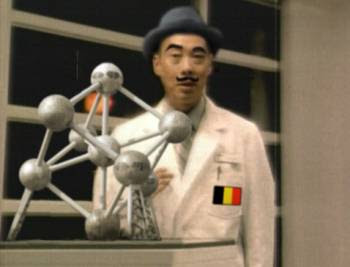In February 1924, on the page where there would usually be humorous hand-drawn strips, the Neuer Grenzmann ran a nine panelled strip, showing the adventures of The Guardian, a caped crusader made after the revolution to protect the new German Republic. It proved so popular, that they continued the comic, making a month-long story told over the six days of the week that the comic was printed on.
In December of that year the paper published a book that had all 14 24-page stories that had been published that year. It was the fastest selling item that Christmas.
The Guardian was you all-around do-good hero. He could fly, was super strong and super tough. He was the man Germany sent when they didn't want to get the army involved. Parents loved him because he taught good German values and kids loved him as he punched bad guys.
His most memorable adventure was his third, when he was sent to fight the Communist Automatons in South America. Another one was when he teamed up with The Shadow of Justice, a secretive hero that proved so popular he got his own solo story in 1926.
The comic was often praised for its detailed visuals and commitment to geographical accuracy. However, in a more liberal time, the older stories would be looked down upon. An example would be a story set in Africa, where the natives were portrayed as little more than animals. Another would be when The Guardian was fighting Mexicans, and gave all the men, regardless of their age, large moustaches and terrible accents. The story that caused the most uproar at home however, was a story where one of The Guardian's enemies, the Showman, forced the hero to be MacBeth. It drew criticism as the witches were drawn in the manner of a Jewish stereotype.
That said, other nations, particularly the European ones, were treated with more grace. Some even got their own heroes that The Guardian would either team up with or fight. The Russian hero, for example, was Bear Man, who could rip automobiles in two with his bare hands (thankfully, that is not a pun in German). Some were...less heroic. Like the French hero, who was never outright named at the time, was slightly effeminate and was prone to control battles from afar.
Seeing how lucrative this business was, another paper, the Hamburg Press, decided to run their own comic strip. But they decided to look to the future, fearing a rise in vigilantism if they do a superhero comic. But other than that, the formula remained unchanged.
So they made Johan Schmidt, Space Policeman! He was a member in an international consortium that protected Earth's interests in the Solar System. They were like police. The stories were told in chronological order, begging, the writers thought naturally, at the start of his career.
Over the years he would meet and occasionally fight the insect-like Mercuians (reluctant to fight - either pacifists or cowardly, depending on the writer); the lizard people of Venus (imperialistic, Schmidts main foe); the small, furry Moon people (small but tough); the Martians (your 'noble savage', very much taken from Native American ways of life); the slug-like Jovians (tended to be shown very much as corrupt businessmen); the humanoid Saturnine that lived in floating cities of crystal (mysterious, other worldly, wise); or the intelligent beasts of Uranus and Neptune; or any alien being that was no more than an animal.
The series was just as popular as The Guardian comics, the collections also selling like hotcakes at Christmas. The series was praised not only for the stunning alien landscapes, but the technology and the character development. The comic drew criticism, however, from the right as Johan frequently was teamed up with a communist, and portrayed them as good people, only victims of the will of others.
Parents also didn't like the fact that Johan didn't always play by the rules, and he always got away with breaking them. The stories also tended to be more adult and topical The Guardian's stories, but kids didn't care, as it was pictures of people shooting funny beams of light at lizard people.
Gotthard Benedikt, the main writer, did use the comic to air his, for the time, revolutionary views. For example, one story where Johan busted Venusians smuggling 'Martian Fun Weed' to Earth was seen as the very first protest against hallucinogenic drugs.
With the discovery of Pluto in 1930, the paper ran a 3-part story, with a new alien species arriving, known only as the 'Greys'. They said they were from Pluto, but the end of the story hinted that they controlled an empire that spanned the stars.
So the two comics remain in healthy competition, with some families buying both papers just so their kids can read both comics.
----
Notes:
I would so love to go on and describe how the Johan Schmidt stories change over the years in the terms of scale (Solar System to the galaxy, the species names and origins changing), technology and the various media they will hopefully be presented in, but that would require foreknowledge that I don't have. I just imagine Johan's story would be started again whenever writers want something major changed.



